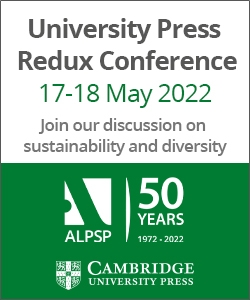Redux 2022: Spotlight on Sustainability
The 4th ALPSP University Press Redux 2022 will take place virtually in partnership with Cambridge University Press on 17-18 May. Redux 2022 will approach the pressing themes of diversity and sustainability from a practical angle, focus on implementation and not be afraid to ask the difficult questions.
As the 2022 ALPSP University Press Redux Conference co-organised with Cambridge University Press draws close, I think back to March 2020 when I chaired a session discussing sustainability. The session ended up being really well attended. One, thanks to it being virtual, but also because being sustainable as a publisher was still only a small discussion point for most. Since 2020, we’ve seen extreme weather conditions across the globe, school children taking a stand and calling for action, COP26 and a damning first section of the new IPCC report.
Sustainability and what needs to be done to fight climate change is no longer a footnote on monthly meetings.
Sustainability and what needs to be done to fight climate change is no longer a footnote on monthly meetings. As publishers, especially publishers of the science, it’s clear that we cannot only be publishing about the impacts of climate change, we need to change the way we work as well. It was with this thinking that we decided to put together two panel discussions at Redux 2022 focussing on sustainability in the publishing supply chain and travel.
Chair of the sustainable supply chain panel Karina Urquhart from BIC and the Green Book Alliance will be joined by panellists to answer the question, How can you be carbon neutral, if your freight and supply chain isn’t? Discussing moving away from print with Jon Ray of Wiley and Liz Martin of IOP Publishing, the impact of the digital transition with the DIMPACT project with William Pickett of Carnstone, and how sustainable supply chain changes can be communicated through metadata with Graham Bell of EDItEUR.
Everyone on the panel is on a journey and will be sharing practical steps and advice on how they are working towards more sustainable supply chains for both larger and smaller publishers.
Next to supply chain, travel is one of the biggest contributors to carbon emissions. It is potentially one of the biggest changes individuals in publishing and academia can make to have an impact on emissions. It’s a challenging subject as many look forward to those in-person connections at conferences after the last two years and our industry is built on personal relationships. The second sustainability panel will be asking the question, Do you still need to make that trip? Panel chair Joanna Chamberlain, Head of Sustainability at the University of Cambridge, will be discussing the impact of reducing travel on both the publishing industry, with Chris Hart of Manchester University Press, and on academics, with Andrew Balford of the University of Cambridge and Elizabeth le Roux of the University of Pretoria in South Africa.
This session will ask the hard questions around impact, on profession and the planet, and act as the perfect lead-in to our conference sessions focussing on EDIB.
Becoming a more sustainable industry is not only a business shift, but also requires a perspective shift on where value lies for the industry. It is hard work to change and there are difficult questions to ask around industry change. Both these sessions aim to leave attendees with practical takeaways that will contribute to moving the conversation forward.

Sustainability at University Press Redux 2022
Session 1: Supply Chain in Publishing and Challenges – 17 May, 13:00-14:15 BST
Session 2: Environment and Travel – 17 May, 14:30-15:30 BST






